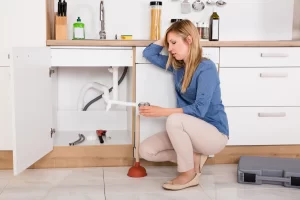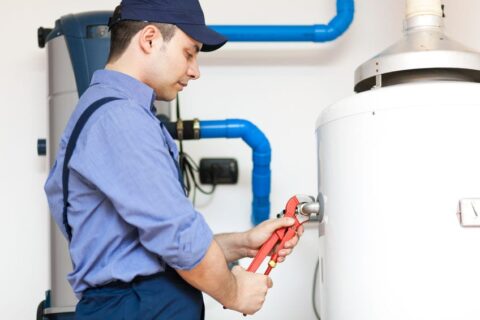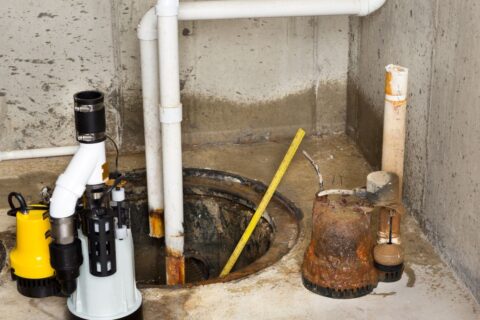How to Maintain Your Dishwasher’s Plumbing Lines for Optimal Performance
Key Takeaways
-
Cleaning and maintaining your dishwasher plumbing lines can save you from unwanted clogs, help your appliance run more efficiently, and prolong its operating life. Ignoring maintenance will result in more expensive repairs and other issues as a result of a loss of functionality.
-
Before getting into routine maintenance, make sure you have the right tools on hand. Have these materials on hand to make the process quick and easy.
-
White vinegar
-
Sponge
-
Socket wrench
-
Warm water
-
-
To start, disconnect your dishwasher and check the plumbing lines for clogs or leaks. Next, flush the lines with a vinegar solution to clear any buildup.
-
Take care of common concerns such as clogged lines, leaks, and low water pressure right away to avoid performance issues and water damage.
-
To avoid clogs in the future, rinse dishes before loading the dishwasher, don’t overload the dishwasher, and use dishwasher-safe detergents. Cleaning and inspecting them regularly helps ensure your dishwasher continues to operate as it should.
-
If you face ongoing problems such as recurring clogs or strange sounds, consult a professional. More complex plumbing issues that simple troubleshooting can’t fix need a professional’s touch.
Properly maintaining your dishwasher’s plumbing lines will go a long way towards ensuring that your appliance continues to run properly and prevents any mishaps. Food particles, grease, and mineral buildup are all factors that can cause clogs over time. This can cause decreased efficiency and blowing out expensive repair bills.
With a little regular care, your dishwasher can work its best to save you time and money over the long haul. Preventative measures such as clearing out blockages, cleaning the dishwasher’s filters, and examining the hoses can go a long way. Cleaning products and proper water pressure are a big help too.
By maintaining your dishwasher’s plumbing lines, you can save some headaches down the road and get more years of use out of your dishwasher! Regular maintenance is smart and ensures your appliance works for you for years to come.
Importance of Dishwasher Plumbing Maintenance
Proper maintenance of your dishwasher components is important for ensuring optimal performance. It’s a simple maintenance step that helps keep your appliance happy and healthy. Scheduled maintenance can help mitigate clogs in the dishwasher drain line and other buildup which can limit water flow.
With continual use, food particles, grease, and soap residue can build up in the plumbing lines, leading to a clogged dishwasher drain that affects performance. To avoid problems from developing, be sure to clean the filter out regularly. For optimum results, run your dishwasher on an empty cycle with a dishwasher-safe detergent cleaner or a vinegar/baking soda combination.
These steps are simple to complete and go a long way in preventing plumbing disasters. Dishwashers will run and clean more efficiently with clear plumbing lines. When water can flow freely, your dishwasher cleans your dishes better and uses less energy, which actually lowers your water bill.
On the subject of saving money, regular dishwasher maintenance will help keep your appliance running longer, too. By regularly maintaining your dishwasher, you save it from excessive use, leading to fewer repairs and more overall enjoyment before it’s time for a new dishwasher.
Neglecting regular maintenance can have serious financial consequences. A dripping dishwasher could lead to extensive water damage to your kitchen, and plumbing repairs can get expensive quickly.
In truth, industry research indicates that 80% of dishwasher drainage problems can be avoided through routine maintenance. A little work today prevents a lot of headaches tomorrow.
Tools Needed for Maintenance
As you work to maintain your dishwasher maintenance routine, having the right tools available is key to successful upkeep of your dishwasher’s plumbing lines. Here’s a quick list of essentials: a bucket or dish pan, white vinegar, sponge or cloth, dish soap, a socket wrench set, and warm water.
Tool-wise, you’ll usually need an adjustable wrench, pliers, a screwdriver, and a 3/4 by 3/8 inch hose fitting. Each tool serves a different purpose, so collecting everything you need in advance prevents wasting time once you get started on your dishwasher cleaning tasks.
Before diving into the maintenance game, it’s wise to examine your tools one by one and ensure they are in good working condition. A sponge or a wrench covered in grease, for example, could introduce objectionable residue to your dishwasher drainage system.
Organizing your workspace really enhances efficiency. Place your tools out on a workbench or side counter so they are easy to access when you need them during the cleaning process.
When using fittings, begin by slipping a compression nut and ferrule onto the copper tubing. Screw the nut clockwise along the 3/8-inch compression threads, inserting the nut about an inch in to secure the dishwasher drain line.
To avoid leaks, make sure the water supply line is pushed in all the way into the fitting. Put a paper towel under joints to catch any leaks. Retighten as necessary to achieve a good seal on your appliances.
How to Clean Dishwasher Plumbing Lines
1. Disconnect the dishwasher safely
Begin by disconnecting your dishwasher from the power source to remove any electrocution hazard. For your protection, turn off the circuit breaker that supplies power to the dishwasher so that you are sure the unit is off while working on it.
If your dishwasher was just running, allow it to cool so you don’t come in contact with any hot surfaces or components and get burned. Use an adjustable wrench and other proper tools to remove water supply lines and other plumbing connections carefully, so as not to strip connections.
2. Inspect the plumbing lines for clogs
Examine the drain hose for obvious blockages like food or grease. Around 90% of dishwasher clogs are caused by these sources, which is why it’s important to target areas where debris is most prone to accumulate.
Check every connection point for leaks, wear, and loose connections, replacing any damaged pieces as necessary. Check the drain pump to make sure it’s operating properly, since a broken pump can make it impossible to drain properly.
If you know you have a clog, a drain snake can remove larger, non-dissolvable obstructions from the lines before attempting to use chemicals to clean clogs.
3. Flush the lines with water or vinegar
Combine one cup of white vinegar with two cups of water. Pour this cleaning solution into the bottom of the dishwasher, letting it sit for 30 minutes.
This further aids in breaking down grease and other residue. Run a short wash cycle to wash away loosened debris.
To really deep clean your dishwasher, combine 1/4 cup of baking soda with 1/2 cup of distilled vinegar. Next, pour the mixture into the drain opening.
4. Reattach and test the dishwasher
Reattach the dishwasher by fastening all parts back together, including filters and dish racks. If there is really stuck-on debris, soak the filters in hot, soapy water first.
Once you have everything reassembled, reconnect power by plugging the dishwasher in or turning the circuit breaker back on.
Once you’re done cleaning all the plumbing lines, run a test cycle to ensure good operation and drainage. Keep an ear out for loud or strange noises, or any indications of backup or clogging.

Common Plumbing Issues in Dishwashers
Dishwashers have become an integral part of the American home, serving as a convenient appliance for washing dishes while using less water and detergent. However, common plumbing issues, such as a clogged dishwasher drain, can disrupt their operation and lead to costly problems if not addressed with proper dishwasher maintenance tips.
Clogged or Slow-Draining Lines
A frequent dishwasher plumbing issue is water not draining completely, leaving a puddle of murky water on the bottom. This usually indicates a blockage in the drain hose. First, check the drain area for any food particles or debris that may be blocking the flow.
If you have a particularly stubborn clog, a plumbing snake can go a long way, especially if they’re farther down the line. Run it every day, preferably with hot water, to help everything flow freely. Consistent cleaning avoids clogging at the connection point where the dishwasher hose meets the plumbing underneath your sink.
Leaks in the Plumbing Connections
We all know that leaks can lead to serious water damage, and often mold growth as well. Check for water collecting under the dishwasher or wet patches beneath the kitchen sink. Make sure to tighten any loose connections and replace any worn gaskets to make sure you have a tight seal.
Check connections regularly to identify leaks before they become a serious issue.
Low Water Pressure Affecting Performance
If dishes are still coming out dirty, low water pressure could be the issue. Verify that the water inlet valve is functioning and check the supply line for any obstructions.
If you continue to have pressure issues, you may need the assistance of an expert plumber.
Troubleshooting Dishwasher Plumbing Problems
Check for visible blockages
First, remove the bottom rack of your dishwasher to expose the dishwasher drain area. Food particles and debris tend to build up in this area, leading to clogging and drainage issues. Because 80% of dishwasher problems are due to clogged filters, taking this space to clean it can quickly rectify many dishwasher plumbing problems.
Shine a flashlight in order to locate clogs that may be lurking in hard-to-reach areas. If you notice water collecting at the bottom, try running a constant stream of water from the sink to test it. At the same time, turn on the garbage disposal.
If it’s too full, it can prevent the disposal from draining, leading to backups. A short 30-second blast of cold water will wash it through.
Test the water inlet valve
The water inlet valve regulates the water flow into the dishwasher. If you hear any clicking or buzzing noises when the wash cycle is running, it may indicate that it is failing. Mineral deposits or clogs can slow water flow, particularly with the smaller 3/8-inch tubing often used for supply lines.
The sole valve might need replacing if it doesn’t open/close properly. This is a typical problem that pros such as Randy are able to fix. His expertise was very helpful, and I will absolutely call him again for any plumbing needs.
Inspect the drain hose for kinks or damage
Inspect the drain hose along its entire length carefully for bends or cracks. Make sure both ends are pretty tight to prevent any leaks.
Any kinks or damaged sections need to be replaced to ensure proper drainage. Simple maintenance tips, such as clearing any clogs, go a long way in making sure your dishwasher drains properly after every load.
Tips to Prevent Clogs and Damage
Avoid overloading the dishwasher
Not only will overloaded dishwashers leave dishes dirty, but they will create a dangerous risk of clogged plumbing lines. Follow the manufacturer’s recommendations for loading capacity, as overloading can inhibit adequate water circulation.
Load your dishes in a way that cups, plates, and utensils do not obstruct the spray arm from spraying. For example, load bigger objects such as stock pots or frying pans on the bottom shelf and smaller items on top.
Don’t tightly pack items—ensure that there is space for water to drain and flow naturally. Periodically check your loading practices to make sure you aren’t loading more than you realize in a single pass.
Rinse dishes before loading
Although powerful, modern dishwashers can benefit from you knocking off large food particles before loading the dishes to avoid clogs and damage. Wipe off any food remnants or grease prior to loading dishes in the dishwasher.
A little pre-cleaning with a quick rinse of hot water helps, especially for food like rice that clings or oily substances. Get your household on board to help turn this into a habit.
If you’re washing fragile items, a light rinse will remove the dirt without damage and can be followed by a full cycle.
Use appropriate detergents and cleaners
Selecting dishwasher-safe detergents, formulated especially for these systems, will help prevent residue accumulation. Not only is this wasteful, but using more soap than you need can create excess foam that clogs drains.
Choose a monthly cleaner, like a natural, biodegradable cleaner like Bio-One, to breakdown built-up grease and organic material. Additionally, perform a cleaning cycle with a combination of baking soda and vinegar every two months to keep your disposal running at peak performance.
Reading these product labels will help you make sure what you’re buying is compatible with your dishwasher model.
Schedule regular inspections and cleaning
Regular upkeep will ensure that your dishwasher plumbing stays clog-free and damage-free. Clean the drain lines and flush them with water every 6 months.
If the spray arm does get clogged often, soak it in a solution of white vinegar and water. Replace or clean the filter basket every few months to prevent clogged debris.
Add a hot water cycle every month or two to ensure food particles are flushed out. Inspect your drain hose and sink air gap often to make sure water is draining normally.
Thorough documentation of maintenance activities can go a long way in keeping you ahead of the date of accident claims.
Signs Your Dishwasher Needs Professional Help
At times, despite your best upkeep, your dishwasher will still require further assistance. If you find yourself facing frequent plumbing problems that basic maintenance and care cannot resolve, it’s time to get in touch with an emergency plumber. Don’t wait until it’s too late! Regular dishwasher maintenance is crucial for preventing issues.
For example, problems such as water not draining properly may indicate the dishwasher drain line or drain tube is clogged. You may be able to inspect for blockages on your own, but only a professional will be able to ensure the line is completely cleared. Failing to address this can lead to more extensive repairs or worse—having to replace the dishwasher completely, which is much more expensive.
Strange sounds or odors may indicate more serious plumbing issues. If your dishwasher is gurgling or emitting an unpleasant odor, it may signal that there’s a clog or buildup somewhere in the plumbing line. Regularly cleaning the dishwasher’s filter and checking for any obstructions is key to maintaining proper dishwasher drainage.
Once you start seeing the signs, you usually need a plumber’s skills to make things right again for good. Repeated clogs or drainage issues that continue to occur no matter what you’ve tried are another warning signal. If cleaning the filter or checking for blockages doesn’t do the trick, we recommend calling in the pros.
Certain problems, such as a leaking dishwasher, can lead to serious water damage. Repairing these issues properly the first time around will alleviate future costs and headaches. Local services, such as Roto-Rooter, make a fortune providing people with solutions to these dishwasher plumbing needs.
Conclusion
Proper maintenance of your dishwasher’s plumbing lines ensures it will perform effectively for years to come. Regular cleaning, quick fixes for minor problems, and staying alert to signs of trouble can save you time and money. Tips such as removing debris, ensuring no leaks, and using the correct tools can go a long way. Learning when to call in a pro saves your appliance from more serious problems.
A few minutes of maintenance prevents build up and wear, so you can rest assured your dishwasher is up to the task of tackling big loads day after day. Give it the proper care and you’ll save yourself headaches and ensure its proper function. Improve your dishwasher’s performance right from step one and watch the difference unfold right before your eyes. To learn more tips on maintaining your home, keep checking back—we’ll see you soon!
Frequently Asked Questions
How often should I clean my dishwasher’s plumbing lines?
To ensure your kitchen appliance operates efficiently, maintain your dishwasher’s plumbing lines every 3–6 months. This regular dishwasher maintenance helps avoid clogs, buildup, and unpleasant odors, ultimately prolonging its lifespan and preventing costly problems.
What are common signs of dishwasher plumbing issues?
Pay attention to slow drainage, water collecting at the bottom, strange sounds, or lingering smells, as these are often signs of a clogged dishwasher drain or damaged lines.
Can I use vinegar to clean my dishwasher’s plumbing lines?
Vinegar is a safe and effective cleaning agent for dishwasher maintenance. To flush out any built-up grease and debris in the dishwasher drain line, run an empty washing cycle with 1–2 cups of white vinegar.
What tools are needed to maintain dishwasher plumbing lines?
Assemble a flathead screwdriver, a small brush, a bucket, and a microfiber cloth for efficient dishwasher maintenance. You may want a plumber’s snake to address stubborn clogs in the dishwasher drain line.
How can I prevent clogs in my dishwasher’s plumbing lines?
Remember to scrape food off dishes before loading and not to overload the dishwasher itself, as this can lead to a clogged dishwasher drain. Make sure to clean the dishwasher filter frequently and monitor for any debris accumulation to avoid costly problems.
When should I call a professional for dishwasher plumbing issues?
If you’re encountering recurring dishwasher drainage problems, leaks, or your DIY solutions aren’t effective, call a professional plumber to assess the situation. What seems serious could be a minor issue that the experts can isolate and fix efficiently.
Does dishwasher maintenance save money in the long run?
Absolutely, preventative care, including regular dishwasher maintenance tips, prevents major damage and the need for dishwasher replacement. It ensures your dishwasher continues to run in top shape, saving you both water and energy bill costs.


